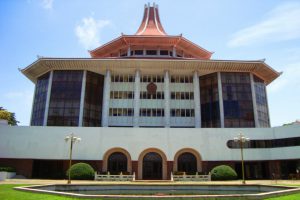Supreme Court of the Democratic Socialist Republic of Sri Lanka: A Full Judge Bench of Sisira. J. de Abrew, Murdu Fernando and Gamini Amarasekara, JJ., allowed a petition which was filed by the petitioner alleging that her Fundamental Rights guaranteed by Articles 12(1), 12(2), and 14(1)(g) of the Constitution had been violated by the Respondents.
The Petitioner who passed had the GCE (Ordinary Level) with five distinctions in the year 2000 and the GCE (Advanced Level) with two credit passes and one simple pass in the year 2003, was appointed as Management Assistant in the Department of Irrigation on contract basis with effect from 21-5-2008, thereafter her services were extended till 31-12-2014. Thereafter, the Petitioner was appointed to the post of clerk with effect from 24-10-2014 and stated that she had fulfilled the requirements stated in the said Circular. After the Petitioner assumed duties as a clerk, she was paid salaries from January 2015 to August 2015 on the salary scale stated in the said letter of appointment. However, the Petitioner’s appointment to the post of clerk was cancelled with effect from 17-11-2014 which was the date of the letter of appointment.
The Senior State Counsel (SSC), Mr. Rajiv Goonatilake contended that the Petitioner was not entitled to be appointed to the post of clerk since the said Circular had authorized to appoint Management Assistants to the permanent cadre only if they (Management Assistants) were drawing the salary scale of MN1 and in the current case Petitioner was not on the salary scale of MN1 but on the salary scale of MN2. According to the contention of the SSC, if the Petitioner was drawing a salary of Rs.13,120/-, she was entitled to be appointed to the permanent cadre. It was alleged that it is an accepted principle in law that no man is permitted to take advantage of his own mistake. This view was supported by the observation made by His Lordship Justice Sansoni in the case of Kanapathipillai v. Meerasaibo, 58 NLR page41 at page 43 wherein His Lordship had observed thus “no man is allowed to take advantage of his wrong.” The Court observed that in the present case, the Petitioner’s appointment to the post of clerk (permanent cadre) was cancelled on the basis of an alleged mistake committed by the Director-General of Irrigation who had acted on behalf of the Government.
The letter of appointment stated that this post was permanent and pensionable. Her salary was Rs.13,120/-. The Government paid her salary (Rs.13,120/-) on the basis that she had been appointed to the post of clerk for eight months and remitted Rs.870/- monthly to the W&OP. This was established by her salary slips marked as P10(i) to P10(viii). The Petitioner gave up her post of Management Assistant on contract basis when she was appointed to the new post. Presently, the Petitioner had lost her earlier post of Management Assistant and her new post of clerk.
The Court relied on certain judicial decisions considering the question of whether the Petitioner had a legitimate expectation of continuing in the permanent cadre of the Government Service. In the case of Dayaratne v. Minister of Health, (1999) 1 SLR 393 this court held that,
“On the facts of the case, the petitioners had a legitimate expectation that they would, upon satisfying prescribed conditions, be provided with a course of training for the examination leading to the award of the certificate of competency as Assistant Medical Practitioners. The decision effecting a change of policy which destroyed the expectation of the petitioners did not depend upon considerations of public interest. In deciding upon the conflicting interests of Graduate Medical Officers and Assistant Medical Practitioners, the 1st, 2nd and 3rd respondents (the Minister, his Secretary and the Deputy Director General Administration, respectively) considered the views of the GMOA and yielded to their pressure. Neither the views of the Assistant Medical Practitioners nor those of the petitioners were sought. Hence, rights of the petitioners guaranteed by Article 12 (1) of the Constitution were violated.”
Other cases relied on by the Court were Sirimal v. Board of Directors of the Co-operative Wholesale Establishment, (2003) 2 SLR 23; Surangani Marapana v. Bank of Ceylon, (1997) 3 SLR 156 and Pinnawala v. Sri Lanka Insurance Corporation, (1997) 3 SLR 85.
The Court finally considering all the matters above held that Petitioner had a legitimate expectation to continue in the permanent cadre of Government Service until the date of her retirement.
The Court while allowing the petition held that Petitioner’s fundamental rights guaranteed by Article 12(1) and 14(1)(g) of the Constitution had been violated by the Director General of Irrigation who acted on behalf of the Government and further held that Petitioner was entitled to be in the permanent cadre of Government Service on conditions stipulated in her letter of appointment directing the respondent to pay her back wages and other remunerations from the date that she was stopped from reporting for duty along with compensation decided by the Court.[D.B.D Rajapakshe “Prashakthi” Ratmalwala v. Y. Abdul Majeed, SC. FR Application No. 418 of 2015, decided on 12-02-2021]
Suchita Shukla, Editorial Assistant has put this story together

